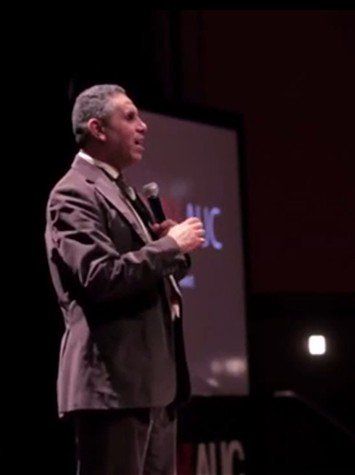The first time I saw Adel Mostafa, he was giving a speech in TEDx AUC. His presence on stage captivated the crowd – naturally, as any theatrical actor – as he told his inspiring story. He went through his journey as Egypt’s first blind theatrical actor, and then director. Despite the naysayers, he came out on top and is still thriving with passion for the performing arts. I sat down with him and Ahmed Nagy, a blind finger-painter whose work is considered one of a kind in Egypt, to talk about their art, dreams and most importantly, their stories.
Adel’s strong, passionate presence on stage, led us to wonder just how supportive his family was for him to turn out this way “it was a bit strange for them to have a son who wanted to become an actor. I think they didn’t believe it in the beginning because I was naturally hyperactive and did things that my siblings – who are also blind – didn’t do”, Adel recalls, “but when I made the decision to become an actor, my family supported me and my mother attended my plays and encouraged me until I got to where I am now” he adds.
Adel’s passion for acting started quite early in his lifetime “I started acting since I was in high school. We had plays at the end of each year. My knowledge about theatrical acting increased in college when I joined the theatre team. I learned how to walk on stage and how to deal with the décor and so on”, he says, “I learned a lot from directors but a big part of it was me doing my best to teach myself”.
However, despite his persistence, Adel has met some difficulties, “in the beginning, many directors would ask ‘how are you going to be on stage when you are unable to see?’ but I started getting through to them and managed to convince them that I can do it, but when I first started out I was terrified”.
Adel moved on to an even more daring step, and decided to use his theatrical talents in directing in 2007, “I had been considering directing since I was in college and when I got the chance, I decided to do it”, Adel tells, “they kept asking me if I was sure I’ll be able to do it”.
Despite his confident exterior as he was embarking on his first step in directing, Adel had his moments of doubt, “a week before the play while everyone asked if I was sure this was going to work, I would be reassuring them while deep down I was very worried” Adel explains. He told us that his concern stemmed from the fact that this is the kind of experience which could have had unmatched success or failed miserably. Fortunately for him, the former happened and the hard work that he had to go through with his team for 40 days prior to the show, paid off.
Ahmed Nagy, finger-painter and Adel’s friend and colleague who was responsible for the media and advertising for the event itself was in the crowd “no one was prepared for the play to turn out so well. They were all there for the ceremony, the gallery and the orchestra, really. During the first couple of minutes everyone was talking but as the play progressed this changed and they started paying attention”, Ahmed tells.
This positive feedback is all well and good but is it enough? Adel and Ahmed do not believe so, “the reason behind the success for most challenged individuals starts from their homes and upbringings. Unfortunately, the government doesn’t do much”, Ahmed says, “We need to raise awareness in our society. You wouldn’t believe the amount of people whose social level has provided them with enough wealth and education and commit catastrophic mistakes when dealing with a challenged child of theirs”.
In conclusion, both gentlemen had a few pointers as to how they would like to see challenged individuals treated and represented by the government “I really hope Human Rights would be taught in schools. It’s extremely important to teach people to have respect for those with challenges”, Ahmed says. “The constitution needs to have an article obligating the government to facilitate and assist any challenged individual in fields like arts and education”, Adel concludes.
People like Adel and Ahmed do not want any special treatment. As a matter of fact, they do not need it. What they need, however, is the kind of support that any citizen is entitled to. Their demands regarding the education and the constitution will not benefit them personally, but will benefit the society as a whole.

